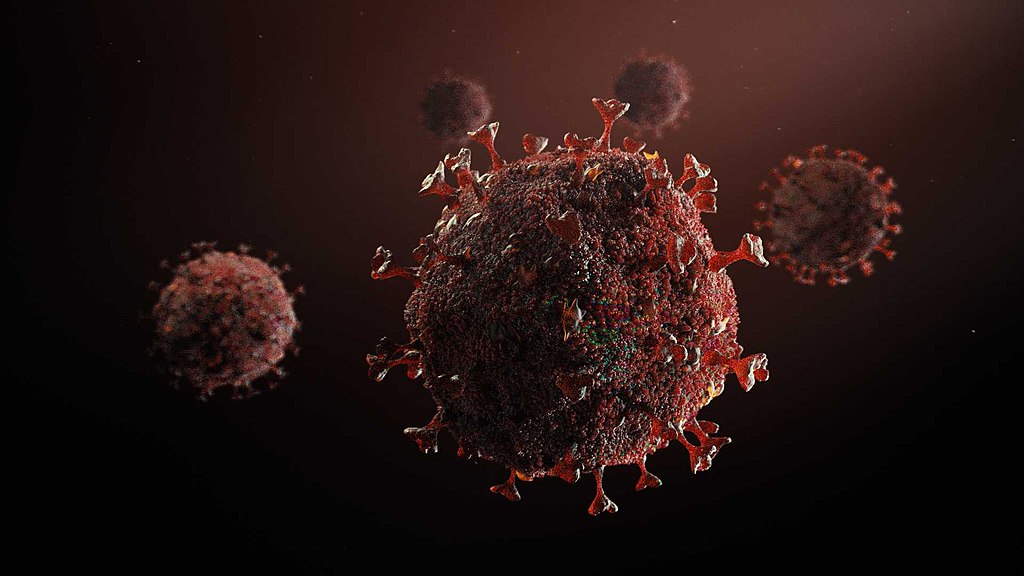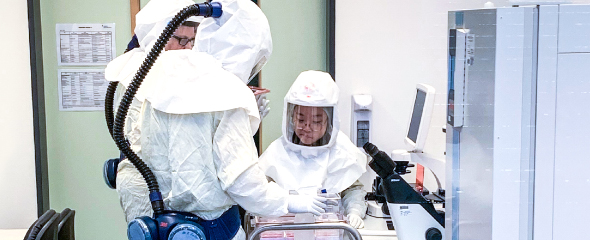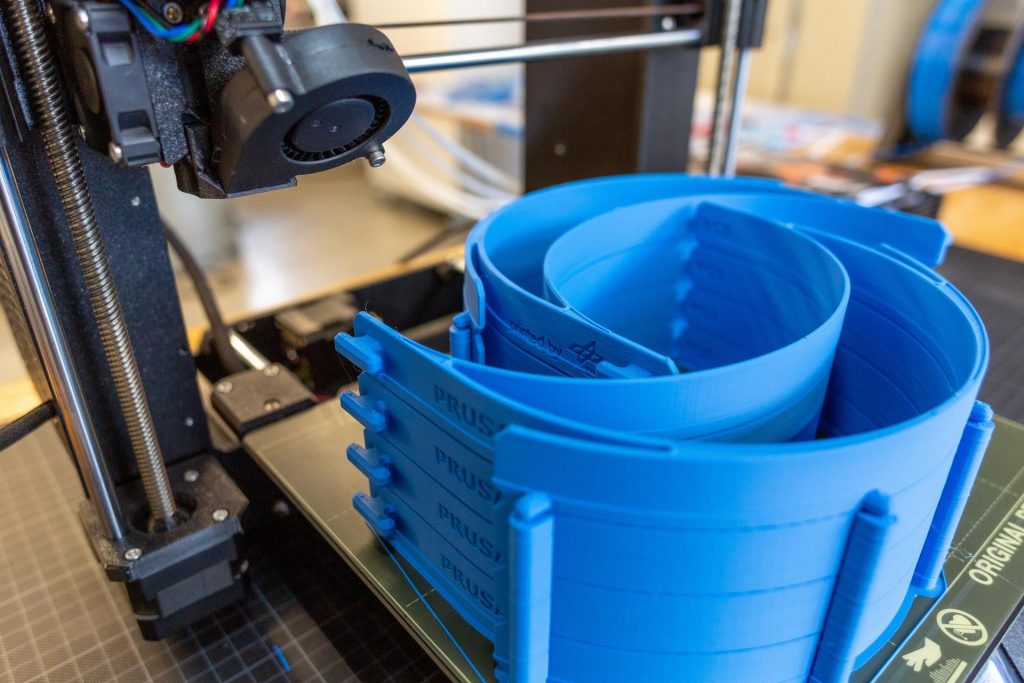Coronavirus Pandemic: how Braunschweig Research Institutions are Working Together to Combat the Virus
Startseite » Coronavirus Pandemic: how Braunschweig Research Institutions are Working Together to Combat the Virus
Coronavirus Pandemic: how Braunschweig Research Institutions are Working Together to Combat the Virus
The coronavirus crisis presents society, politics and research with particular challenges all over the world. In the Braunschweig region, too, the coronavirus pandemic is changing daily life.

“Science is Hope”
“Science is hope” – this important message shines on the Okerhaus of the TU Braunschweig. A guiding principle that describes the Braunschweig region more aptly than ever, because research is being carried out with great commitment throughout the region and active efforts are being made to jointly overcome the effects of the pandemic. The sense of community has never been more important than now – including in science. Within the ForschungRegion Braunschweig, intensive work is being carried out to research and combat the virus and its effects on society and the economy, joint activities are being coordinated, competences are being bundled and commitment is being shown in the region. This article aims to provide an overview of the diverse research projects and support services.
TU Braunschweig and HZI are Researching the Virus
University institutions, such as the Institute for Biochemistry, Biotechnology and Bioinformatics of the Technische Universität Braunschweig, and non-university research centers such as the Helmholtz Centre for Infection Research (HZI) are working intensively on researching COVID-19 and developing suitable therapy methods.
Biotechnologists from TU Braunschweig are involved in an international research project in which novel antibody therapies are to be developed for the treatment of the lung disease COVID-19 caused by the coronavirus. This is not about a vaccine, but an acute therapy using antibodies. In the international research network ATAC (Antibody Therapy Against Corona-Virus), the Braunschweig research team led by Professors Dr. Michael Hust and Dr. Stefan Dübel are responsible for developing the human antibodies. To this end, they are working closely with research groups from Sweden, Belgium, Italy and Switzerland.
The HZI focuses on research projects that contribute to a better understanding of the virus and the development of active substances and vaccines; in addition, HZI scientists are researching the dynamics of the spread of infection in the population. To this end, the HZI, which has many years of expertise in infection research, is pooling resources with its locations and cooperation partners for a large number of projects. Examples include the testing of a large number of potential active substances, biological safety level 3 laboratories in which it is possible to carry out investigations with intact pathogens, and the development of a mouse model of infection with SARS-CoV-2, which is an important prerequisite for developing vaccines and antiviral active substances for use in humans.

The HZI is coordinating, among other things, a nationwide antibody study to find out how many people already have antibodies against SARS-CoV-2 in their blood – i.e. have already contracted COVID-19 and are now immune to the virus. The HZI team led by epidemiologist Gérard Krause is working with the German Center for Infection Research (DZIF), the blood donation services, the NAKO health study, the Robert Koch Institute (RKI) and the Institute for Virology at the Charité in Berlin.
In order to slow down the further spread of the virus, consistent management of the contact persons of confirmed cases of infection is necessary. To this end, the German public health service (ÖGD) will in future be able to use a special version of the epidemic management app SORMAS, which was developed at the HZI together with national and international partners in response to the Ebola outbreak in West Africa in 2014. A coronavirus module was added to the application in the course of the global COVID-19 outbreak. In this way, SORMAS can support the public health departments in real time with contact person management by networking all relevant stakeholders, such as hospitals, laboratories and authorities.
Networking of Support Services in the Braunschweig Region
The platform WeCare, launched by TU Braunschweig, also aims to network committed stakeholders as efficiently as possible. Here, the university coordinates support requests from outside as well as the diverse decentralized support services from within the university, checks their feasibility, legally secures the projects and coordinates networking with other initiatives in the region. The projects that have emerged as part of WeCare include supporting the Braunschweig hospital in the evaluation of coronavirus tests in the laboratory by providing technology and personnel through the Technische Universität and the HZI. According to Dr. Horst Hannig, Head of the Central Facility for Molecular Diagnostics at the Braunschweig hospital, this could increase the test capacities from 180 evaluated samples per day to 500 samples.
A further cooperation that has emerged from the initiative is the collaboration between the TU Institute for Electrical Measurement Technology and Fundamentals of Electrical Engineering, headed by Prof. Dr. Meinhard Schilling, and the Braunschweig-based companies Kroschke sign international, Capical GmbH (a spin-off from the Institute) and injection molding manufacturer Reiher GmbH. The project partners have been manufacturing face shields since mid-April and supplying them to hospitals, fire departments and the police in order to counteract the shortages of protective equipment in Braunschweig and the region. The first 10,000 face shields will be delivered to the Braunschweig hospital; up to 100,000 units could be produced.
The Ostfalia University of Applied Sciences is also supporting the production of face shields in the university’s own Center for Additive Manufacturing (ZaF) by 3D printing urgently needed elements, such as special headbands and plastic reinforcements. The DLR’s 3D printers were also running at full speed in March and April, producing 1400 face shields, which were delivered to the Wolfsburg hospital, among others.
Voluntary commitment, especially from the ranks of students in the region, is also bundled via the Sandkasten platform of TU Braunschweig.

How the Coronavirus Pandemic is Affecting Nursing and the Tourism Industry
The Ostfalia University of Applied Sciences is currently researching how the delegation of non-specialist personnel in nursing and intensive care can succeed against the background of the coronavirus pandemic and the possibility of rapidly increasing COVID19 infection rates. The research team led by nursing and health scientist Prof. Dr. Martina Hasseler has already developed a rapid delegation model for this case, which is intended to make it easier in practice to assess non-specialist personnel, such as medical students, and to deploy them in a competence- and target-oriented manner. In addition, the existing research project “NOVELLE – Acting safely in an emergency”, also headed by Prof. Hasseler, has been expanded to include new dimensions in the wake of the coronavirus pandemic. In the interdisciplinary research project, which was launched in August 2019, a project team from nursing, medicine, ethics, law and IT wants to develop emergency algorithms that provide concrete instructions for particularly frequent and relevant emergencies in nursing homes. Hasseler and her team see the coronavirus pandemic as a special case that now needs to be examined as part of the research project in order to derive instructions for nursing homes on how to deal with COVID-19.
The tourism industry has been affected by the consequences of the Corona pandemic like hardly any other economic sector. This is evidenced by the results of a survey conducted by the Institute for Tourism and Regional Research at Ostfalia University on the impacts of the Corona pandemic on the German tourism industry. The results of the survey, conducted by Prof. Dr. Ernst-Otto Thiesing among 973 tourism service providers, suggest that the economic consequences of the shutdown could in some cases reach existential proportions, and the effects will likely still be felt until autumn.
Braunschweig Hospitals Expand Capacities
Naturally, the three Braunschweig hospitals, Klinikum Braunschweig, Herzogin Elisabeth Hospital, and Krankenhaus Marienstift, must also be mentioned, as they ensure comprehensive medical care for sick individuals in the region. Together with the Braunschweig crisis team, the hospitals developed a concept to ensure adequate inpatient care during the Corona pandemic and additionally increased their capacities for Corona patients. To prevent supply bottlenecks and ensure the provision of supplies to the hospital and the region, Klinikum Braunschweig also produces disinfectants in its in-house pharmacy. Furthermore, Klinikum Braunschweig is involved in fact-based communication about the coronavirus through a series of animated clips published on the hospital’s social media channels. “Easy to understand and accessible to all” – this is how the hospital aims to answer questions about the virus and the measures taken, and to send a clear signal against fake news.
Corona Pandemic in the Museum
Finally: The Corona pandemic will go down in the history of the 21st century as a pivotal event – that much is already clear. Preserving the present for the future, the Braunschweigisches Landesmuseum has therefore made it its mission and is calling on the Braunschweig population in a collection campaign to submit documents, photos, and objects as contemporary witnesses of this event in contemporary history. Guided by the question of how we will remember the Corona pandemic in the future, the museum welcomes suggestions for anything that has become a symbol of the Corona crisis for the people of the region, from homemade face masks to photos of empty city centers and toilet paper sculptures.
Update may 19, 2020: many more Research Projects from the Braunschweig Region
Breakthrough in Drug Development
The biotechnology company YUMAB, a spin-off of TU Braunschweig specializing in the production of human antibodies, achieved a breakthrough in the development of suitable drug candidates against the SARS-CoV-2 virus a few days ago, in cooperation with the HZI and TU Braunschweig. Tests in the biosafety level 3 laboratories of the HZI, using a “real” SARS-CoV-2 virus strain, showed that some candidates caused complete neutralization of the virus. Specifically, it was shown that the viruses no longer infected living cells after the antibody was added. Discussions on the next steps with regulatory authorities have already begun, according to YUMAB, and they are confident that the first human studies can commence as early as autumn 2020.
Mathematical Decision-Making Aids
Mathematicians, computer scientists, and medical professionals from the Young Academy, TU Braunschweig, the University of Stuttgart, and the company Arctoris demonstrate that various scientific disciplines can jointly develop solutions in the fight against viruses. The interdisciplinary team has developed a decision-making aid that calculates which method most effectively identifies all individuals infected with COVID-19 in a positive sample pool. In sample pooling, sample material from different individuals is combined into one sample (pool) and tested together. If the sample is negative, none of the individual samples contained within it need to be tested separately. In case of a positive result, further tests must be carried out. In total, the scientists simulated five pool testing procedures for five countries using a mathematical modeling approach. Algorithms calculate, based on various parameters, which of the pooling methods is most effective under which conditions. The team’s simulations show that pool-based testing procedures in Germany can be approximately eight times more efficient than individual tests.
Antiviral Surfaces
Surfaces play a central role in containing the Corona pandemic: For example, the current mask shortage could be counteracted by sterilizing respirators, as these can then be reused. Together with Städtisches Klinikum Braunschweig, the Fraunhofer Institute for Surface Engineering and Thin Films IST has launched a project to further develop suitable test procedures for checking the sterilization effects, particle permeability, and material tightness of FFP2 masks and to validate the results. Equally important is the disinfection of surfaces that people come into contact with daily, such as doorknobs or handrails in public transport. An alternative to wipe disinfection could be a virus-killing coating. Fraunhofer IST sees potential approaches here through the use of antiviral coatings to curb the spread of the virus via surfaces.
Further Links
Braunschweig University of Technology
Antibodies against Viruses: https://magazin.tu-braunschweig.de/pi-post/antikoerper-gegen-viren/
WeCare Platform: https://www.tu-braunschweig.de/we-care/projektuebersicht
Support for Klinikum Braunschweig (together with HZI): https://klinikum-braunschweig.de/aktuelles-veranstaltungen/aktuelles.php?article=226&page=1
Sandkasten Platform: https://www.sandkasten.tu-braunschweig.de/corona
Mathematical Decision-Making Aids: https://magazin.tu-braunschweig.de/pi-post/mathematische-entscheidungshilfe/
Helmholtz Centre for Infection Research
Overview of current projects and funding for combating the pandemic: https://www.helmholtz-hzi.de/de/aktuelles/news/news-detail/article/complete/corona-forschung-auf-hochtouren-am-hzi/
Nationwide Antibody Study: https://www.helmholtz-hzi.de/de/aktuelles/news/news-detail/article/complete/bevoelkerungsstudie-untersucht-immunitaet-gegen-covid-19/
Epidemic Management App SORMAS: https://www.helmholtz-hzi.de/de/aktuelles/news/news-detail/article/complete/sormas-unterstuetzt-gesundheitsaemter-beim-kontaktpersonenmanagement/
Ostfalia University of Applied Sciences:
Delegation of non-specialized personnel in nursing and “NOVELLE – Acting safely in an emergency”: https://www.ostfalia.de/cms/de/huk/kommunikation/presse/pressemitteilungen-2020/fakultaet-gesundheitswesen-delegationsmodell/
Impacts of the Corona pandemic on the German tourism industry: https://www.ostfalia.de/cms/de/huk/kommunikation/presse/pressemitteilungen-2020/befragung-tourismuswirtschaft/index.html
Production of Face Visors: https://www.ostfalia.de/cms/de/huk/kommunikation/presse/pressemitteilungen-2020/ostfalia-unterstuetzt-bei-der-herstellung-von-gesichtsvisieren/
Braunschweig Hospitals
Concept for Care during the Corona Pandemic: https://klinikum-braunschweig.de/aktuelles-veranstaltungen/aktuelles.php?article=224
Production of Disinfectants: https://klinikum-braunschweig.de/aktuelles-veranstaltungen/aktuelles.php?article=214&page=2
Animated Clips on the Coronavirus: https://klinikum-braunschweig.de/aktuelles-veranstaltungen/aktuelles.php?article=217&page=2
DLR
Production of Face Visors: https://www.dlr.de/content/de/artikel/news/2020/02/20200420_dlr-in-braunschweig-produziert-gesichtsschilde.html
Braunschweigisches Landesmuseum
Collection Campaign: https://www.3landesmuseen.de/Corona-ins-Museum.1974.0.html
YUMAB GmbH
Breakthrough in Drug Development: https://www.yumab.com/wp-content/uploads/2020/05/2020.05.07_YUMAB-PR_SARS-CoV-2_DEU.pdf
Fraunhofer Institute for Surface Engineering and Thin Films
Disinfection of Masks and Antiviral Coatings: https://www.ist.fraunhofer.de/de/pressemitteilungen/2020/Fraunhofer-vs-Corona.html
